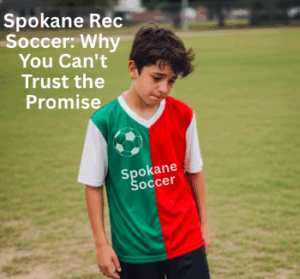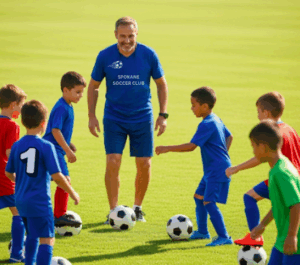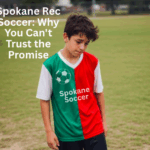“Recreational Soccer” Needs a Transformation
The Face of Disappointment: Recreational Soccer Fails Our Children
Club Soccer vs. Rec Soccer: A Parent's Guide to the Differences

1. Unqualified Coaching Creates a Developmental Chasm
The most glaring indictment of the traditional recreational league model, observed widely in Spokane, is the creation of a profound developmental chasm through unqualified coaching. As early as age eight, and certainly by thirteen, a vast skill gap emerges between players in these leagues and those receiving instruction from genuinely qualified coaches. The reliance on volunteers "without professional qualifications" means that fundamental technical and tactical understanding is rarely imparted effectively. Children are left kicking the ball aimlessly, unable to pass accurately even short distances, and lacking any coherent idea of how to progress play. This isn't just a minor setback; it's a systemic failure that places young players in a state of "soccer poverty," forcing them to perpetually lag behind their peers and stifling any real potential for growth or sustained enjoyment in the sport.
2. "Fun" Without Progress Leads to Disengagement
Furthermore, the prevalent emphasis on "fun" in Spokane's recreational soccer leagues is often a deceptive facade that masks a lack of genuine progress. While enjoyment is crucial, true fun in any endeavor, especially sport, stems from improvement, mastery, and the satisfaction of learning and applying new skills. When practices are chaotic—with kids climbing on nets, struggling coaches, and no clear theme or focus on player behaviors—"fun" becomes a hollow promise. What enjoyment can be derived from not getting better at something, from endlessly repeating mistakes due to a lack of proper guidance? This superficial notion of "fun" ultimately deprives children of the deeper satisfaction that comes from skill acquisition and tactical understanding, potentially leading to disengagement and premature abandonment of the sport.
true fun in any endeavor, especially sport, stems from improvement, mastery, and the satisfaction of learning and applying new skills. When practices are chaotic—with kids climbing on nets, struggling coaches, and no clear theme or focus on player behaviors—"fun" becomes a hollow promise. What enjoyment can be derived from not getting better at something, from endlessly repeating mistakes due to a lack of proper guidance? This superficial notion of "fun" ultimately deprives children of the deeper satisfaction that comes from skill acquisition and tactical understanding, potentially leading to disengagement and premature abandonment of the sport.
3. Ineffective Practice Environments Hinder Learning
The catastrophic failure of recreational soccer practice environments within these leagues is another critical reason for their obsolescence. Observing a typical recreational soccer practice in Spokane reveals a scene of disorganization and inefficiency. A dozen kids might show up, balls are kicked indiscriminately, and coaches struggle to establish order. The session often devolves into perfunctory laps, brief "drills" conducted in lines, and then an immediate scramble for a scrimmage, with "nothing learned." There is no discernible theme, no focus on specific player or team behaviors, and no coherent progression. This chaotic, unproductive environment is not just suboptimal; it is actively detrimental to learning, ensuring that children are not exposed to the structured, purposeful training necessary to develop their abilities and understanding of the game.
4. Financial Exploitation and Lack of Accountability
Beyond the field, there is a significant issue of financial exploitation and a profound lack of accountability by some of the organizations that run these recreational leagues in Spokane. Parents are asked to trust these local entities, yet it becomes clear that neither of the two organizations in our city care about the development of players. Yet, they collect fees while offering only volunteer coaching, often without any verifiable experience or qualifications. This begs the question: would any parent pay a school to have someone without experience teach their child mathematics? The analogy holds true for sport, which is, at its core, an "educational endeavor." These organizations operate with minimal oversight regarding coaching quality and player development, effectively taking money for a service that often falls far short of what children deserve.
The Path Forward: A Professional, Educational Paradigm for Spokane Youth Soccer
The only viable path forward for youth soccer in Spokane is an imperative for a professional, educational paradigm shift. Sport unequivocally deserves a place in a child's development, but only when it is treated as a serious educational pursuit,  not a casual babysitting service that the current recreational soccer program do. It is time to abandon the term "Recreational Soccer" and for the organizations perpetuating this flawed model to either adapt or dissolve. Parents in Spokane must place their trust in instruction from coaches who possess demonstrable experience in managing groups and hold recognized qualifications. This shift will ensure that children learn the game, become more knowledgeable players, and are equipped to stay in the sport longer, truly fulfilling the potential that lies within every young athlete. The current recreational model is an impediment to this potential; its transformation is a necessary step towards a brighter future for youth soccer in the Lilac City.
not a casual babysitting service that the current recreational soccer program do. It is time to abandon the term "Recreational Soccer" and for the organizations perpetuating this flawed model to either adapt or dissolve. Parents in Spokane must place their trust in instruction from coaches who possess demonstrable experience in managing groups and hold recognized qualifications. This shift will ensure that children learn the game, become more knowledgeable players, and are equipped to stay in the sport longer, truly fulfilling the potential that lies within every young athlete. The current recreational model is an impediment to this potential; its transformation is a necessary step towards a brighter future for youth soccer in the Lilac City.

